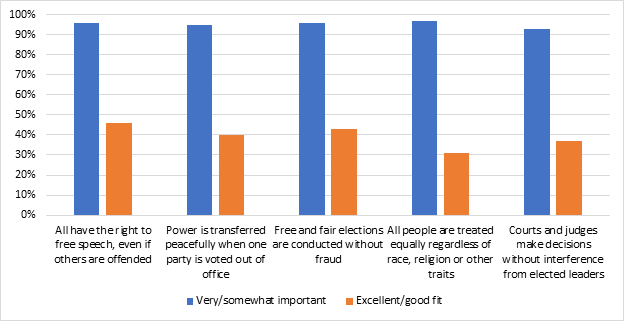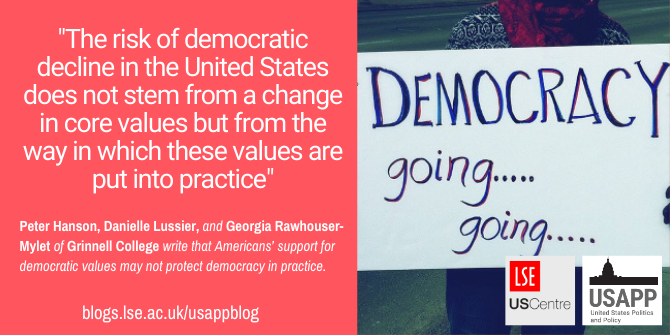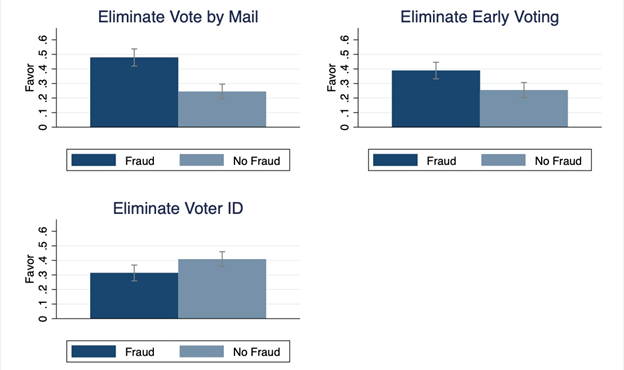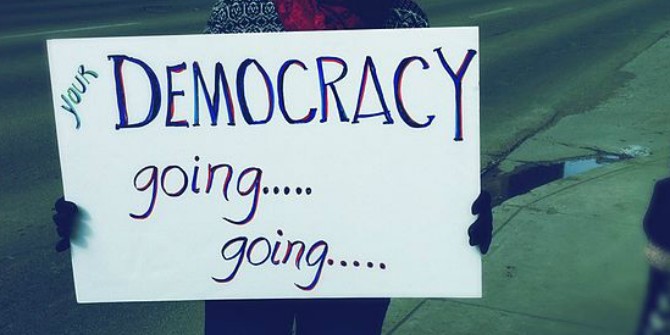

 Former President Trump’s claims that he lost the 2020 election because of voter fraud, and the increasing number of states enacting voter restrictions have led to questions about the state of democracy in the US. In new research, Peter Hanson, Danielle Lussier, and Georgia Rawhouser-Mylet find that in general, support for democratic values in the US is robust. But they also determine that Americans who believe that the 2020 election outcome was fraudulent were much more likely to support restrictions on voting such as voter ID measures and eliminating vote by mail and early voting.
Former President Trump’s claims that he lost the 2020 election because of voter fraud, and the increasing number of states enacting voter restrictions have led to questions about the state of democracy in the US. In new research, Peter Hanson, Danielle Lussier, and Georgia Rawhouser-Mylet find that in general, support for democratic values in the US is robust. But they also determine that Americans who believe that the 2020 election outcome was fraudulent were much more likely to support restrictions on voting such as voter ID measures and eliminating vote by mail and early voting.
There has been widespread concern about the potential for democratic decline in the United States in the wake of the contested 2020 presidential election. Using new polling data, we find that 1) the belief that there was fraud in the 2020 election is associated with modestly lower support among Americans for core democratic values, but overall, support for these values is robust, and 2) beliefs about election fraud shape how Americans support democratic values in practice, with those who believe in fraud supporting reforms that would curtail voting rights. It seems that the risk of democratic decline in the United States does not stem from a change in core values but from the way in which these values are put into practice.
Our findings are consistent with past research which has established that attacks on democracy in contemporary times are typically framed in the language of democracy. Luhrmann and Lindberg document a persistent use of legal methods to restrict political rights, while in their recent book, How Democracies Die, Levitsky and Ziblatt cite the erosion of informal norms that served to prevent democratically-elected leaders from using democratic institutions as political weapons. In Cultural Backlash, Norris and Inglehart identify a broad shift in values that encourages political entrepreneurs to disregard democratic norms and principles, all of which helps explain the global rise in electoral authoritarian regimes. In many countries we see that such leaders initially win competitive elections, but once in power they turn their criticism of government performance into an attack on key liberal pillars of democracy, such as a free press, civil society, and the presence of a legitimate opposition. Using the weight of their political power, they sow further distrust by demonizing opponents, spreading false information, and putting up formal barriers that serve to hollow out the safeguards that make elections free and fair.
Looking into democratic decline in the US
In the 2020 presidential election in the United States, former President Donald Trump made repeated evidence-free claims that his loss was due to widespread voting fraud. These claims were repeatedly rejected by courts and by the Department of Justice. Nonetheless, they were widely accepted by supporters of the president and offered as a justification for the storming of the Capitol on January 6th, 2021. Since then, a number of states have begun considering or enacting laws to restrict voting in the name of improving elections security. Georgia adopted a bill that cuts the amount of time voters have to request absentee ballots, implements stricter voter ID requirements, and prevents anyone from providing food or water to people waiting in line to vote. In Iowa, lawmakers passed legislation that requires polls to close an hour earlier, shortens early voting by nine days, and makes it illegal for local elections officials to mail absentee request forms to all voters. The combination of these events has triggered concerns among many observers about the erosion of democracy in the United States.
In response to these events, Grinnell College National Poll fielded a number of questions on democratic decline in the United States. The poll is a national telephone survey of 1,012 adults 18 and over, and was fielded from March 24 – 28 by Selzer & Co.
First, the poll asked respondents how much they valued a set of core democratic principles: freedom of speech; the peaceful transfer of power; free and fair elections; equal treatment for people regardless of race or religion; and, independent courts. Second, it asked about the degree to which these principles described the United States. Third, it asked about their confidence in future elections and support for a group of significant changes to electoral systems. The results were troubling.
There is disagreement about core democratic values among the American public
As Figure 1 shows, while virtually all Americans express support for core democratic principles, in each case less than a majority said they believed that these principles actually described the United States – a remarkable failing report card on the state of American democracy from the American people. Democracy’s survival over time is dependent on broadly shared public agreement that the political institutions in place align with their intent. Without such an agreement, democracy is in danger of eroding into a form of competitive, electoral authoritarianism.
Figure 1 – Importance and fit for core democratic principles

Next, we analyzed whether there was a difference in support for core values based on whether or not respondents believed there was enough fraud in the 2020 election to change its outcome. Overall, 35 percent of respondents reported the belief that the 2020 election was tainted by fraud. But we found little evidence that this belief was closely associated with attitudes about core democratic values.
Using regression analysis we tested the relationship of each of the values to a belief in fraud in the 2020 election and a group of demographic variables. Only two democratic values had a statistically significant relationship with the belief that fraud shaped the 2020 election: the importance of the peaceful transfer of power and independent courts. In both cases, the differences were modest, and majorities of respondents said the values were important. “Fraud” respondents rated a peaceful transfer power as “very important” at a level 10 points below “no fraud” respondents (85 percent to 75 percent). Similarly, there was a 4-point difference (78 to 74 percent) between “no fraud” and “fraud” respondents rating an independent court system as “very important.”
People can support democratic principles and restricting voting at the same time
While support for democratic principles remained strong regardless of respondent views on fraud, we found dramatic differences in the way Americans thought about these principles in practice. The poll asked respondents to evaluate three significant changes to the conduct of elections. Two of these – the elimination of mail-in balloting and the elimination of early voting – would restrict the voting franchise. The third – eliminating voter ID requirements – would broaden it. About a third of respondents favored each option.

“Democracy Going” by JmacPherson is licensed under CC BY 2.0
We tested the relationship between support for each of the changes to election systems and a belief in fraud, support for free and fair elections, and a standard battery of demographic variables, in three models. Our analysis found no correlation between any of these options and valuing free and fair elections. By contrast, there was a statistically significant relationship between a belief in fraud and support for the two options that would restrict voting.
As Figure 2 shows, nearly 48 percent of “fraud” respondents favored a complete elimination of mail-in voting compared to 25 percent of “no fraud” respondents. Similarly, 39 percent of “fraud” respondents favored a complete elimination of early voting, compared to just 26 percent of “no fraud” respondents. “Fraud” voters were also 9.5-points more likely to favor keeping voter ID laws intact.
Figure 2 – Support for changes to electoral systems by belief in electoral fraud

Note: Grinnell College National Poll (March 2021)
What explains the stark difference in the way in which “fraud” and “no fraud” respondents operationalize their desire for free and fair elections? The answer appears to be that “fraud” respondents have taken to heart Trump’s claim that election results cannot be trusted. Over 74 percent of “no fraud” respondents expressed confidence their votes will be counted accurately in future elections, while 75 percent of “fraud” respondents did not.
Support for democratic values may not protect democracy
Our results show that challenges to liberal democratic institutions can come cloaked in democratic language and democratic values. While virtually all Americans profess allegiance to core democratic values such as free and fair elections, the peaceful transfer of power, and independent courts, they differ substantially in how to put those values into practice. Former President Donald Trump’s attack on the legitimacy of the 2020 election undermined confidence in the American system of elections and increased support for extreme changes that have already started to curtail voting rights. Political legitimacy is frequently overlooked until it has disappeared. Public trust in democratic institutions—not just the individuals who embody institutions— has helped the United States to progress through political, economic, and national crises that have arisen over the past 200 years while maintaining the same constitutional order. Yet, the growing erosion in widespread acceptance for what a fair and free electoral process looks like in the United States is likely to further undermine key aspects of American democracy.
Please read our comments policy before commenting.
Note: This article gives the views of the author, and not the position of USAPP – American Politics and Policy, nor the London School of Economics.
Shortened URL for this post: https://bit.ly/3blrITu
About the authors

Peter Hanson – Grinnell College
Peter Hanson is an Associate Professor of Political Science at Grinnell College and a specialist in American politics. He is the director of the Grinnell College National Poll.
 Danielle Lussier – Grinnell College
Danielle Lussier – Grinnell College
Danielle N. Lussier is an Associate Professor of Political Science at Grinnell College. She is the author of Constraining Elites in Russia and Indonesia: Political Participation and Regime Survival (Cambridge, 2016).
 Georgia Rawhouser-Mylet
Georgia Rawhouser-Mylet
Georgia Rawhouser-Mylet is a graduate of Grinnell College Class of 2021. She is a research assistant for the Grinnell College National Poll.



